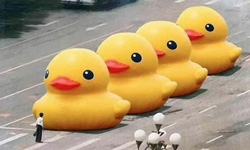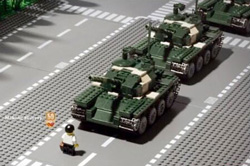Tiananmen Square online searches censored by Chinese authorities
Daily News Article — Posted on June 4, 2013
Note: This article is from the British newspaper The Guardian.

Twitter image mocking Chinese censorship of Tiananmen Square, adapted from AP’s 1989 photograph (the search term ‘Big Yellow Duck’ is banned).
(by Jonathan Kaiman, The Guardian) BEIJING – It takes a very significant date for the word “today” to be deemed too sensitive to mention. But 24 years after the Chinese government’s bloody crackdown on pro-democracy protesters in Tiananmen Square, “today” is part of a long list of search terms that have been censored on Sina Weibo, the country’s most popular microblog.
Other banned words include “tomorrow,” “that year,” “special day,” and many number combinations that could refer to 4 June 1989, such as 6-4, 64, 63+1, 65-1, and 35 (shorthand for May 35th).
Chinese Communist party authorities, fearing a threat to their legitimacy, forbid open discussion of the so-called “June 4th incident” in the country’s media and on its internet. Yet internet users have reacted by using ever-more oblique references to commemorate the tragedy, treating censors to an elaborate game of cat-and-mouse.
Many of their posts have been embedded in pictures, which can often elude automatic detection: a girl with her hand over her mouth; a Lego man facing down three green Lego tanks; the iconic “tank man” picture with its tanks photoshopped into four giant rubber ducks, a reference to a well-known art installation in Hong Kong’s Victoria harbour.
Most of these pictures, too, have since been scrubbed clean. By Tuesday afternoon, the term “big yellow duck” had also been blocked.
Officially, the Chinese government considers the Tiananmen protest a “counter-revolutionary rebellion,” and its subsequent crackdown – the declaration of martial law, troops firing indiscriminately at unarmed demonstrators – as necessary for maintaining social stability. Many one-time protesters have since been consigned to the margins of Chinese society. Some have spent long stints in jail; others have fled the country. A large number still face regular harassment by security agents.

A Lego version of AP’s photo of a man blocking tanks during the Tiananmen Square protests on 4 June 1989.
On Tuesday, Beijing was both overcast and smoggy, the noon sky as dark as early evening. Volunteer guards with red armbands were stationed every 100 meters on Chang’an Avenue, a broad boulevard which runs past Tiananmen Square in the heart of the city. A group of Hong Kong journalists were briefly detained for filming at an early morning flag-raising ceremony in the historic square and were forced to delete their footage.
On Saturday, China’s foreign ministry spokesman, Hong Lei, censured U.S. calls to provide a full account of the crackdown, calling them “political prejudice.” He warned Washington not to make “groundless accusations” and to “stop interfering in China’s internal affairs.”
Last week, Sina Weibo appeared to have rolled out a new censorship function – searches for “Tiananmen incident” and “six-four incident” were not blocked, but instead pulled up posts about other historical events, such as a 1976 demonstration in Tiananmen Square mourning the death of Premier Zhou Enlai. Yet as of Monday, searches resulted in the regular message: “According to relevant laws, regulations and policies, search results for ‘six-four incident’ cannot be displayed.”
Many prominent intellectuals and celebrities on Sina Weibo have simply taken the day off from posting in an act of quiet protest. One appears to be the prominent film-maker Jia Zhanke. “Don’t worry about forgetfulness – at least the Sina censors remember,” he wrote on 3 June, according to the blog Tea Leaf Nation. The post has since been deleted.
Reprinted here for educational purposes only. May not be reproduced on other websites without permission from The Guardian.
Questions
PLEASE NOTE: ”Answers by email” has ended for the school year. ”Answers” emails will resume on Sept. 3rd. The last daily posting to the website will be June 7th, and resume toward the end of August.
1. List the internet search terms the Chinese Communist government has banned in an effort to block its citizens from reading about the government massacre of peaceful protesters in 1989.
2. Why has the government made this attempt to block the truth?
3. How are internet users responding to the government's ban?
4. How has the Chinese government responded to U.S. calls for it to provide a full account of the crackdown?
5. Read the "Background" and "Resources" below. Do you think the Communist government will succeed in misinforming their citizens as well as making them forget Tiananmen Square? Explain your answer.
Background
Massacre at Tiananmen: June 4, 2009 is the Twentieth anniversary of the crackdown on democracy at Tiananmen Square: (from bobsonwong.com/dfn/focus/china/tian10.htm)
In April 1989, Hu Yaobang, the former reform-minded Communist Party general secretary [of China], died. Hu had been purged from the party leadership in 1987 [for his reform ideas], and Zhao Ziyang replaced him as general secretary.
Hundreds of thousands of students mourned Hu’s death by staging large demonstrations in Tiananmen Square in Beijing, the country’s capital. Led by people like Beijing University student Wang Dan, the students demanded an end to government corruption, greater personal and political freedom, and improved conditions in China’s colleges.
The turning point came in May, when Soviet President Mikhail Gorbachev visited China. International journalists who came to Beijing to cover the summit beamed to the rest of the world live images of thousands of students occupying Tiananmen Square and going on a hunger strike.
Behind the scenes, Chinese officials argued over what they should do. Moderates such as Zhao Ziyang advocated peaceful dialogue with the students. Hardliners such as Chinese senior leader Deng Xiaoping, who led the country through an economic reform process that limited political change, insisted on using military force to crack down on the demonstrations.
The hardliners eventually prevailed. As demonstrations spread to other cities in May, martial law was declared. On the night of June 3-4, Chinese army troops moved into Tiananmen Square and dispersed crowds, killing and imprisoning thousands. Student demonstration leader Wang Dan was arrested and spent several years in prison before being paroled and exiled to the United States. Human rights groups estimate that hundreds of people detained after protests are still in custody.
The Chinese government continues to refuse to acknowledge any wrongdoing. In the days before the ten-year anniversary, China stopped CNN from broadcasting into Beijing and arrested several dissidents.
